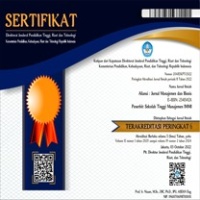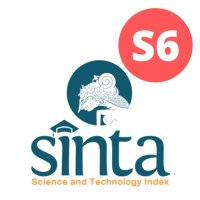EVALUASI IMPLEMENTASI KEBIJAKAN MINIMUM ESSENTIAL FORCE (MEF) PADA POSTUR PEWIRA TNI Jurnal Manajemen & Bisnis Aliansi ANGKATAN UDARA
Abstract
The objective of this research was to understand comprehensively of the evaluation of implementation policy of
Minimum Essential Force (MEF) in pertain of human resources focus on officers in the Indonesian Airforce, I was a
qualitative recearch with an evaluative method of CIPP model, conducted in Ofiice of Ministry of Defence, Indonesian
Armed forces Head quaters, and Indonesian Airforce head quaters, Jakarta.
The data were collected through participant observation using interview, observation, document study, and
recording as well as focus group discussion. The data analysis and intrepretation indicates that (1) Indonesian
defence policy to build of minimum essential force by small and more effective with limited of budget; (2) Scope
Defence policy at minimum essential force: (a) Organization (b) Defence Budget (c) Human resources, Three of them
are able to protect of the sourvergnity and territorial integrity in the border or in the flash point area; (3) MEF Policy
In the Indonesian Air Force should be implemented particularly officers as backbond to catch up effectivity, efficiency,
equity, and responsiveness of implementation management system in the The Indonesian Air Force organization was
found to more effective.
The findings of this evaluation by CIPP methode scored 3,24 as good result, and give some recommendation to
practice continuous improvement to redesign of defence policy by involving of society and in practica to the Air
Force organization to reconstruct human resources planning especially for officers.
Keywords
Full Text:
PDFReferences
Anonim. Buku Himpunan Perundang-Undangan yang terkait dengan Penyelenggaraan dan Pengelolaan Pertahanan Negara. Jakarta: Biro Hukum Sekjen Dephan, 2007.
Abdul Wahab, Solichin. Analisis Kebijaksanaan: Dari Formulasi Ke Implementasi Kebijaksanaan Negara. Jakarta: Bumi Aksara, 2008.
Agustino, Leo.Dasar-Dasar Kebijakan Publik. Bandung: CV Alfabeta, 2006
Arikunto, Suharsimi. Evaluasi Program Pendidikan: Dasar-dasar Evaluasi Pendidikan. Jakarta: Bumi Aksara, 2009.
Armstrong, Michael. Performance Management. London: Kogan Page Limited, 1994.
Baron, Angela & Armstrong, Michael. Human Capital Management, Achieving Added Value through People. United Kingdom: Kogan Page Limited, 2007.
Davenport, Thomas O. Human Capital, What it is, and Why People Invest, San Fransisco, HB Printing, 1999.
De Bruijn, Hans, Managing Performance in the Public Sector, New York: Lemma Publishers, 2002.
Dunn, William N., Public Policy Analysis: An Introduction, New Jersey: Pearson. Edisi Bahasa Indonesia diterjemahkan dari edisi kedua dengan Judul Pengantar Analisis Kebijakan Publik, Yogyakarta: Gadjah Mada University Press, 2003.
Dye, Thomas R., Understanding Public Policy, New Jersey: Prentice Hall, 1995.
Fermana, Surya. Kebijakan Publik sebuah Tinjauan Filosofis, Yogyakarta: Ar-Ruzz Media, 2009.
FitzPatrick et.all. Evaluation In action Interview with Expert Evaluators, California: Sage Publication Inc, 2009.
Fred, R., David, Strategic Management, Concepts and Cases, Tenth Edition, Pearson Prentice Hall, New Jersey, 2006.
Hall, Bradley W, The New Human Capital Strategy, New York: Amacom, 2008.
Henry, Nicholas, Public Administrations and Public Affairs, New Jersey: Pearson Prentice Hall, 2007.
Huntington, Samuel P, The Soldier and the State,The Theory and Politics of Civil-Military Relation, The Belknap Press of Harvard University Press, 1985.
Kinpatrick, Donald L, Kinpatrick James D, Evaluating Training Programs, San Francisco: Barrett Koehler Publishers, Inc. 2005.
Kusuma Negara, Solahuddin. Model dan aktor dalam Proses Kebijakan Publik, Yogyakarta: Gava Media, 2010.
Peraturan dan Perundang-Undangan:
Undang-Undang RI Nomor 3 Tahun 2002 tentang Pertahanan Negara
Undang-Undang RI Nomor 34 Tahun 2004 tentang TNI
Undang-Undang RI Nomor 17 Tahun 2007 tentang RPJP
Peraturan Menteri Pertahanan Nomor : 9/M/XI/2007 tentang Rencana Strategis Pembangunan Pertahanan Negara.
Peraturan Menteri Pertahanan Nomor: 23/M/XII/2007 tentang Buku Putih Pertahanan Indonesia 2008.
Peraturan Menteri Pertahanan Nomor: 22/M/XII/2007 tentang Strategi Hanneg.
Peraturan Menteri Pertahanan Nomor: 24/M/XII/2007 tentang Postur Pertahanan Negara.
Peraturan Menteri Pertahanan Nomor: 07/X/2009 tentang Pengadaan Barang dan Jasa dengan menggunakan fasilitas KE.
Peraturan Menteri Pertahanan Nomor: 10/X/2009tentang
Sistem Perencanaan Pembangunan Pertahanan Negara
Peraturan Menteri Pertahanan Nomor: 15/VII/2009 tentang Pembinaan Tehnologi dan Industri Pertahanan.
Peraturan Menteri Pertahanan Nomor: 03/X/2009 tentang Kebijakan Umum Penggunaan TNI.
Sumber Internet:
http://id.shvoong.com/social-sciences/political-science/2167349,
Elemenkebijakan publik dan tujuan
http://www.scribd.com/doc//Yusrilihza,Contoh : Tahapan Monitoring Dan Evaluasi Kebijakan
http://www.plan.aau.dk. Tine Herreborg Jørgensen, Marie Dolores Mellado, Arne Remmen. Integrated Management systems, (Aalborg University : 2004).
file.upi.edu/Direktori/FIP/JUR.../Bab2ModelEvaluasiSP.pdf, MODEL EVALUASI CIPP (CONTEXT, INPUT, PROCESS, PRODUCT),Posted by Dinar Pratama in Uncategorized November 20, 2010.
Sabatier, Paul. “Top down and Bottom up Approaches to Implementation Research” Journal of Public Policy 6.1986.
DOI: https://doi.org/10.46975/aliansi.v14i2.43
Refbacks
- There are currently no refbacks.
Copyright (c) 2020 Sigit Priyono

This work is licensed under a Creative Commons Attribution 4.0 International License.
ISSN : 2541-545X
Published by:
Universitas Mitra Bangsa
Jl. Tanjung Barat No. 11 Jakarta Selatan
Telp: (021) 7817823 Fax: (021) 7815144
Website: https://umiba.ac.id/











